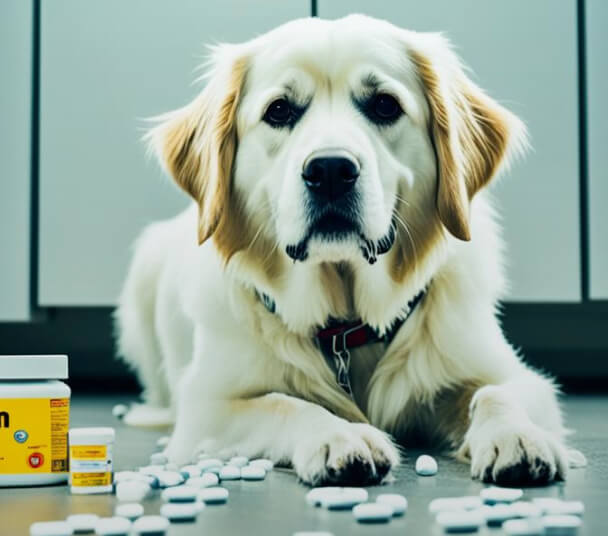As dog owners, we prioritize the well-being of our furry companions. But what happens when your beloved pet accidentally ingests aspirin? Do you know what immediate steps to take? Are you aware of the potential harm it can cause? Let's dive into this critical topic and learn how to safeguard your dog's health.
Accidental consumption of aspirin can pose serious risks to your dog's well-being. However, by acting quickly and appropriately, you can mitigate the potential damage and ensure your dog receives the necessary care.

In this article, we will guide you through the immediate steps to take if your dog eats aspirin. We will explore the signs of aspirin poisoning, identify the symptoms to watch out for, and outline essential procedures to follow for emergency care. Additionally, we will shed light on why contacting a veterinary professional is crucial in such situations.
So, are you ready to arm yourself with the knowledge and strategies to protect your furry friend? Let's begin!
Key Takeaways:
- Accidental ingestion of aspirin can be harmful to dogs and requires prompt action.
- Understanding the signs and symptoms of aspirin poisoning is crucial for timely intervention.
- Following the correct steps for emergency care and contacting a veterinary professional is essential.
- Inducing vomiting and administering activated charcoal may be appropriate in certain cases.
- Monitoring your dog's condition closely and preventing future incidents are vital for their well-being.
Understanding Aspirin Poisoning in Dogs
Aspirin, a commonly used medication for pain relief in humans, can be toxic to dogs if ingested in large quantities. It's important to be aware of the symptoms and signs of aspirin poisoning in dogs to ensure timely intervention and proper treatment.
When a dog ingests aspirin, it can lead to a condition known as aspirin toxicity. The toxicity can occur due to the dog either consuming a single high dose or ingesting smaller doses over an extended period. Aspirin toxicity can affect various systems in a dog's body, including the gastrointestinal, central nervous, and renal systems.
Symptoms of Aspirin Poisoning in Dogs:
- Loss of appetite
- Vomiting
- Diarrhea
- Abdominal pain
- Lethargy or weakness
- Increased thirst and urination
- Difficulty breathing
- Tremors or seizures
In severe cases, aspirin poisoning can lead to internal bleeding, ulceration, and even organ failure. It's vital to recognize these symptoms and signs early on to provide appropriate care to your dog.
If you suspect your dog has ingested aspirin or is showing any of the symptoms mentioned, it is crucial to seek immediate veterinary attention. A veterinarian can perform necessary tests and provide appropriate treatment to help your dog recover.
"If your dog shows any signs of aspirin toxicity, it is important not to delay seeking veterinary care. Early intervention can significantly increase the chances of a positive outcome for your furry friend."
Identifying Aspirin Poisoning in Dogs
When it comes to the well-being of our furry friends, identifying the symptoms and signs of aspirin poisoning in dogs is crucial for prompt and appropriate treatment. If you suspect that your dog has ingested aspirin, it's essential to be vigilant and look out for the following telltale signs:
- Loss of appetite: One of the early symptoms of aspirin poisoning in dogs is a sudden loss of interest in food. If your dog's appetite dramatically decreases or they refuse to eat altogether, it may indicate aspirin toxicity.
- Vomiting: Aspirin can irritate your dog's stomach lining, leading to nausea and vomiting. If you notice your dog regurgitating or retching excessively, it could be a sign of aspirin ingestion.
- Diarrhea: Digestive disturbances, such as loose stools or diarrhea, may occur due to the gastrointestinal irritation caused by aspirin toxicity. Keep an eye out for any changes in your dog's bowel movements.
- Lethargy: Dogs who have ingested aspirin may exhibit lethargy or a general lack of energy. If your normally active dog becomes unusually tired or weak, it could be a symptom of aspirin poisoning.
- Increased thirst and urination: Aspirin can affect your dog's kidneys, leading to increased thirst and urination. If your dog is drinking more water than usual and urinating frequently, it is a potential sign of aspirin toxicity.
- Coordination difficulties: Aspirin poisoning can impact your dog's neurological system, affecting their coordination and balance. Look for stumbling, unsteady movements, or difficulty walking.
In severe cases of aspirin poisoning, dogs may experience symptoms such as seizures, respiratory distress, or even collapse. If you observe any of these severe symptoms or suspect that your dog has ingested aspirin, it is crucial to seek immediate veterinary attention.
To help you better understand the symptoms of aspirin poisoning in dogs, here's a visual representation:
| Symptoms of Aspirin Poisoning in Dogs | Signs of Aspirin Toxicity | |
|---|---|---|
| Seek immediate veterinary attention for severe symptoms. |
Remember, timely identification of aspirin poisoning in dogs is key to ensuring appropriate treatment and the well-being of your beloved pet. Stay vigilant and consult a veterinary professional for a proper diagnosis and guidance.
Steps to Take When Your Dog Eats Aspirin
If your dog accidentally ingests aspirin, it's essential to act swiftly to minimize potential harm. Follow these steps to ensure your pet's safety and provide emergency care.
- Stay calm: Though it can be distressing, try to remain calm and composed. Your dog may pick up on your emotions, and it's important to keep a clear head.
- Remove any remaining aspirin: If there are any aspirin tablets or remnants within your dog's reach, remove them immediately, preventing further ingestion.
- Contact a veterinarian: Reach out to your veterinarian or an emergency pet care hotline for immediate guidance. Provide them with details of the aspirin ingestion, including the dosage and the time it took place.
- Follow professional advice: The veterinarian will assess the situation and provide specific instructions based on factors such as the dog's size, weight, and any underlying health conditions. Follow their advice diligently.
- Do not induce vomiting without professional guidance: While inducing vomiting may be appropriate in some cases, it should only be done under veterinary supervision. Improper administration can lead to further complications.
- Administer activated charcoal (if advised): If your veterinarian recommends it, administer activated charcoal to help absorb the aspirin and minimize absorption into your dog's system.
- Monitor your dog's condition: Keep a close watch on your dog's behavior, looking out for any symptoms of aspirin poisoning. Symptoms may include vomiting, diarrhea, rapid breathing, increased heart rate, and lethargy.
- Follow up with veterinary care: Regardless of whether your dog displays symptoms, it is crucial to schedule a follow-up visit with your veterinarian for further evaluation and to ensure your dog's well-being.
Remember, swift action and professional guidance are vital when your dog ingests aspirin. By taking the appropriate steps, you can help minimize the potential harm and ensure your pet receives the necessary care.
Signs of Aspirin Poisoning in Dogs
| Signs | Description |
|---|---|
| Vomiting | Frequent or persistent vomiting, which may or may not contain blood. |
| Diarrhea | Loose or watery stools, potentially accompanied by blood or mucus. |
| Increased thirst | Excessive drinking and urination due to kidney stress. |
| Rapid breathing | Abnormally fast breathing or panting, indicating respiratory distress. |
| Increased heart rate | Higher than normal heart rate, which may be noticeable through palpitations or a rapid pulse. |
| Lethargy | Unusual tiredness, lack of energy, or reduced interest in activities. |
| Loss of appetite | Decreased interest in food or refusal to eat. |
Contacting a Veterinary Professional
When your dog has ingested aspirin, it is essential to seek immediate veterinary advice and guidance. Contacting a professional is crucial for a proper diagnosis and effective treatment plan tailored to your dog's specific needs.
"Promptly reaching out to a veterinary professional can make a significant difference in ensuring your dog receives the necessary care," says Dr. Emily Johnson, a renowned veterinary specialist. "A veterinarian will evaluate your dog's overall health, assess the severity of the situation, and recommend appropriate treatment options."
Professional guidance is especially crucial because treatment for a dog who ingested aspirin may vary depending on factors such as the amount ingested, the dog's size and breed, and the time elapsed since ingestion.
When you contact a veterinary professional, be prepared to provide important details such as:
- The quantity and strength of the aspirin ingested by your dog.
- Any specific symptoms or changes in behavior your dog is experiencing.
- The time elapsed since your dog consumed the aspirin.
- Information regarding your dog's breed, age, weight, and overall health status.
- Any pre-existing medical conditions or medications your dog may be taking.
By promptly contacting a veterinary professional, you can ensure that your dog receives the necessary treatment and care for the ingestion of aspirin. Remember, time is of the essence in emergency situations, and seeking professional help is crucial for your dog's well-being.
Inducing Vomiting (if appropriate)
Inducing vomiting in dogs who have recently ingested aspirin can be an option to prevent further absorption and minimize the potential harm. However, it is crucial to note that this should only be done if advised by a veterinary professional.
Never attempt to induce vomiting in your dog without consulting a veterinarian first. Administering the wrong substances or inducing vomiting in certain cases can actually worsen the situation and cause additional harm to your pet.
If your dog has ingested aspirin and your veterinarian determines that inducing vomiting is appropriate, they will provide you with detailed instructions on how to safely and effectively induce vomiting at home. It is important to follow these instructions precisely to ensure the well-being of your dog.
Remember, inducing vomiting should only be done under professional guidance, as your veterinarian is best equipped to assess your dog's individual situation and make the appropriate recommendations.
If inducing vomiting is not advised or feasible, there are other treatment options and steps that can be taken to address the ingestion of aspirin and ensure your dog receives the necessary care.
Administering Activated Charcoal (if appropriate)
In certain cases of aspirin ingestion in dogs, administering activated charcoal can be a recommended treatment option. This intervention is typically advised by veterinary professionals to help reduce the effects of aspirin poisoning.
Activated charcoal works by binding to the aspirin in the gastrointestinal tract, preventing its absorption into the bloodstream. This can help minimize the potential harmful effects of the aspirin ingestion.
If you suspect that your dog has ingested aspirin and have consulted with a veterinarian, they may recommend administering activated charcoal. It is essential to follow their instructions carefully, as the dosage and administration method may vary depending on your dog's size, weight, and other factors.
Activated charcoal is available in various forms, including powder, capsules, and liquid suspensions. It is important to note that activated charcoal should only be administered under the guidance and supervision of a veterinary professional, as they will determine if it is appropriate for your dog's specific situation.
Remember, in case of any accidental ingestion or suspected poisoning, it is crucial to seek immediate veterinary assistance. Activated charcoal is just one potential course of action that may be recommended, and the appropriate treatment plan will be determined by a qualified veterinarian.
Monitoring Your Dog's Condition
After aspirin ingestion, it is crucial to closely monitor your dog's condition for any signs of aspirin toxicity. Promptly recognizing and addressing any changes or worsening symptoms is essential for ensuring your pet's well-being. Here are the key indicators you should watch out for:
- Unusual Behavior: Keep an eye out for any abnormal behavior in your dog, such as lethargy, restlessness, or excessive sleepiness.
- Gastrointestinal Issues: Monitor your dog for vomiting, diarrhea, or blood in the stool, as these can be indications of aspirin toxicity.
- Loss of Appetite: If your dog shows a sudden loss of interest in food or a significant decrease in appetite, it could be a sign of aspirin toxicity.
- Increased Thirst: Excessive thirst and urination can be potential symptoms of aspirin toxicity in dogs.
- Difficulty Breathing: Watch for any breathing difficulties or changes in your dog's respiratory patterns, as this could indicate a severe reaction to aspirin.
- Abnormal Bleeding: Pay attention to any unexplained bleeding or bruising on your dog's body, including blood in urine or bloody nose.
If you notice any of these signs or suspect that your dog may be experiencing aspirin toxicity, it is crucial to seek immediate veterinary care. Early intervention plays a vital role in preventing further complications and ensuring the best possible outcome for your furry friend.
Remember, closely monitoring your dog's condition is key to identifying and addressing any adverse effects of aspirin ingestion. Always consult with a veterinary professional to determine the appropriate course of action.
Preventing Future Incidents
While dogs can take aspirin under specific circumstances, it is essential to understand the risks associated with their consumption. Although aspirin can provide relief for certain ailments, it can also pose potential dangers to your furry companion. To ensure the well-being of your dog, it is crucial to take preventive measures and avoid any future incidents involving aspirin ingestion.
The primary risk of dogs consuming aspirin lies in their sensitivity to the medication. Dogs metabolize aspirin differently than humans, making them more susceptible to adverse reactions and potential toxicity. Even moderate doses of aspirin can cause gastrointestinal issues, such as stomach ulcers and bleeding, in dogs. In severe cases, aspirin toxicity can result in organ failure and even be life-threatening.
Prevention is the key to keeping your dog safe from the risks associated with aspirin ingestion. Here are some preventive measures you can take:
-
Always store medications, including aspirin, in a secure location that is inaccessible to your dog. Dogs are naturally curious and may attempt to chew or swallow medications left within their reach.
-
Keep a watchful eye on your dog during walks or outings. Dogs may come across discarded medications or pills on the ground, so it is essential to discourage them from investigating or consuming unknown substances.
-
Consult your veterinarian before administering any medication, including aspirin, to your dog. Your veterinarian can provide guidance on suitable pain relief options and prescribe medication if necessary.
-
Follow proper disposal methods for medications. Avoid flushing medications down the toilet or throwing them in the trash, as they may end up in the environment, posing potential risks to wildlife.
By implementing these preventive measures, you can significantly reduce the likelihood of future incidents involving your dog and aspirin ingestion.
"Prevention is the key to keeping your dog safe from the risks associated with aspirin ingestion."
It is important to remember that every dog is unique, and what may be safe for one dog may not be safe for another. Therefore, always consult your veterinarian before administering any medication or making decisions regarding your dog's health.
| Risks of Dogs Eating Aspirin | Preventive Measures |
|---|---|
| 1. Gastrointestinal issues, such as stomach ulcers and bleeding | 1. Store medications in a secure location |
| 2. Organ failure and life-threatening toxicity | 2. Keep a watchful eye on your dog during walks |
| 3. Consult your veterinarian before administering any medication | |
| 4. Follow proper disposal methods for medications |
Maintaining your dog's health and safety is of utmost importance. By being aware of the risks associated with dogs consuming aspirin and implementing preventive measures, you can provide a safe and comfortable environment for your canine companion.
Alternative Pain Relief Options for Dogs
While aspirin is commonly used as a pain relief medication for humans, it is important to note that dogs should not take aspirin without the guidance of a veterinarian. Although it may be tempting to administer aspirin to your furry companion, it can have adverse effects on their health. Thankfully, there are alternative pain relief options available that are safe and suitable for dogs.
1. Nonsteroidal Anti-Inflammatory Drugs (NSAIDs): NSAIDs are a popular choice for managing pain in dogs. These medications are specifically formulated for animals and provide effective pain relief without the risks associated with aspirin. It is crucial to consult with your veterinarian to determine the appropriate NSAID and dosage for your dog.
2. Physical Therapy and Rehabilitation: Physical therapy and rehabilitation techniques, such as hydrotherapy, massage, and acupuncture, can help alleviate pain and promote healing in dogs. These non-invasive treatments can be customized to address your dog's specific needs and are often recommended for post-surgical recovery or chronic pain management.
3. Nutritional Supplements: Certain nutritional supplements, such as glucosamine and chondroitin, can aid in joint health and reduce inflammation in dogs. These supplements are available in various forms, including tablets, chews, and liquids, and can be beneficial in managing pain associated with arthritis or other joint conditions.
4. Cold and Heat Therapy: Applying cold or heat therapy can provide relief for localized pain in dogs. Cold therapy, such as ice packs or cold compresses, can help reduce swelling and inflammation, while heat therapy, such as heated pads or warm towels, can help relax muscles and alleviate discomfort. It is essential to consult with your veterinarian to ensure the correct application of these therapies.
5. Prescription Medications: In certain cases, your veterinarian may prescribe specific pain medications for your dog. These medications are tailored to address your dog's individual needs and ensure safe and effective pain relief. It is crucial to follow your veterinarian's instructions regarding dosage and administration.
Remember, the best course of action is always to consult with a veterinary professional before administering any pain relief medication or treatment to your dog. They can provide expert guidance based on your dog's specific condition, age, size, and overall health.
Disclaimer: The information provided in this article is for educational purposes only and should not replace professional veterinary advice. Always consult with a qualified veterinarian regarding any concerns or questions about your dog's health or pain management.
Consulting Your Veterinarian
When it comes to the treatment for a dog who ingested aspirin, it is crucial to consult with your veterinarian. Aspirin ingestion can pose serious risks to your furry companion, and professional guidance is essential for ensuring the best course of action.
Your veterinarian will have the expertise to assess the severity of the situation and determine the appropriate treatment plan based on your dog's individual circumstances. They will consider factors such as the size, weight, and overall health of your dog, as well as the amount of aspirin ingested.
Additionally, your veterinarian can provide specific instructions on how to monitor your dog's condition, looking out for any potential signs of aspirin toxicity. They will guide you on the timeline for follow-up visits and any necessary tests to ensure your dog's recovery is progressing as expected.
Remember, the risks of dogs eating aspirin can vary, and only a veterinary professional can provide targeted advice tailored to your dog's needs. Consultation with your veterinarian is key to ensuring the well-being and safety of your beloved pet.
For more information on the treatment and risks associated with the ingestion of aspirin by dogs, please consult with your veterinarian.
"Consulting with your veterinarian is crucial in cases of aspirin ingestion. Their expertise will provide the best guidance and treatment options for your dog's recovery."
Conclusion
In conclusion, it is crucial to act promptly if your dog has ingested aspirin. By following the steps outlined in this article and seeking veterinary advice, you can ensure your pet's safety and well-being. The immediate identification of aspirin poisoning symptoms is key for appropriate treatment. Contacting a veterinary professional is essential to obtain a proper diagnosis and treatment plan.
Remember, prevention is key to avoiding future incidents. It is important to understand the risks associated with dogs consuming aspirin and take preventive measures to keep your furry friend safe. Opting for alternative pain relief options, recommended by your veterinarian, can eliminate the need for aspirin administration.
By closely monitoring your dog's condition after aspirin ingestion, you can identify any changes or worsening symptoms that require immediate intervention. Your veterinarian's expertise and guidance are invaluable in ensuring the best care for your dog. With prompt action, preventive measures, and professional advice, you can ensure the well-being of your beloved pet.
FAQ
What should I do if my dog ate aspirin?
If your dog has ingested aspirin, it is essential to act quickly. Contact your veterinarian immediately for guidance. They will provide specific instructions based on your dog's size, the amount of aspirin consumed, and any symptoms your dog may be experiencing.
What are the symptoms of aspirin poisoning in dogs?
Aspirin poisoning in dogs can cause symptoms such as vomiting, diarrhea, lethargy, loss of appetite, dehydration, stomach ulcers, pale gums, or even seizures. If you notice any of these symptoms or suspect your dog has ingested aspirin, seek veterinary attention immediately.
How can I identify aspirin poisoning in my dog?
Common signs of aspirin toxicity in dogs include vomiting, diarrhea, abdominal pain, decreased appetite, lethargy, increased thirst and urination, pale gums, and even bleeding disorders. If you suspect your dog has consumed aspirin, contact your veterinarian for a proper diagnosis.
What steps should I take when my dog eats aspirin?
If your dog ingests aspirin, the first step is to contact your veterinarian immediately. They will provide guidance on whether you should induce vomiting, administer activated charcoal, or monitor your dog closely at home. Do not attempt any treatment without professional advice.
Should I contact a veterinary professional if my dog eats aspirin?
Yes, it is crucial to contact a veterinary professional when your dog has ingested aspirin. They will provide the necessary treatment and guidance tailored to your dog's specific situation. Do not delay in seeking their advice to ensure your dog's well-being.
Can I induce vomiting in my dog if they eat aspirin?
Only induce vomiting in your dog if advised to do so by a veterinary professional. They will determine whether inducing vomiting is appropriate based on various factors, including the type and quantity of aspirin ingested and your dog's overall health. Always seek professional advice before attempting any treatment.
Is activated charcoal helpful if my dog eats aspirin?
Activated charcoal may be administered in certain cases of aspirin ingestion, as advised by a veterinary professional. It can help absorb some of the toxins and reduce their absorption in the digestive tract. However, only use activated charcoal under professional guidance.
How should I monitor my dog's condition after they eat aspirin?
After your dog ingests aspirin, closely monitor their condition for any changes or worsening symptoms. Keep an eye on their behavior, appetite, thirst, urine output, and overall demeanor. If you observe any concerning developments, contact your veterinarian immediately.
Can dogs take aspirin?
While aspirin may be prescribed by veterinarians in certain cases, it is not recommended to administer aspirin to dogs without professional guidance. Aspirin can have adverse effects and interactions with other medications. Always consult your veterinarian for appropriate pain relief options for your dog.
How can I prevent my dog from eating aspirin?
To prevent your dog from ingesting aspirin, keep all medications securely stored in a location that is inaccessible to them. Be cautious when administering any human medication to your dog, and consult your veterinarian for safe and appropriate pain relief options.
Are there alternative pain relief options for dogs?
Yes, there are alternative pain relief options specifically designed for dogs. Your veterinarian can recommend safe and effective options such as non-steroidal anti-inflammatory drugs (NSAIDs) formulated for canines or other pain management strategies suitable for your dog's specific condition.
Should I consult my veterinarian if my dog ingested aspirin?
Yes, it is crucial to consult your veterinarian when your dog has ingested aspirin. They can assess the situation, provide a proper diagnosis, and recommend an appropriate treatment plan. Consulting a professional ensures your dog's health and safety.
Read my latest posts here:
- Golden Cavapoo Guide: Care, Training & TipsAs a devoted dog lover, I can't help but feel a sense of joy and fulfillment whenever I see a wagging tail and a pair of eager eyes looking up at me. Dogs have this incredible ability to bring light, love, and companionship into our lives, and one particular breed that has stolen my heart… Read more: Golden Cavapoo Guide: Care, Training & Tips
- Adopt a Rescue Cavapoo Today – Find Your Buddy!Imagine coming home to a wagging tail, a warm snuggle buddy, and unconditional love. That's the joy of having a furry friend by your side. But what if I told you that you could not only experience the purest form of companionship but also change a life in the process? By adopting a rescue cavapoo,… Read more: Adopt a Rescue Cavapoo Today – Find Your Buddy!
- Black Cavapoo Puppies: Your Adorable GuideImagine coming home to a furry ball of excitement, wagging its tail and eagerly waiting for your return. Picture the joy of cuddling up on the sofa with a playful companion who brings laughter and warmth to your life. This is the magic that black Cavapoo puppies can bring to your world. Whether you're a… Read more: Black Cavapoo Puppies: Your Adorable Guide
- Straight Hair Cavapoo Traits and Care GuideHave you ever dreamed of having a furry companion who is not only adorable but also hypoallergenic? Someone who will bring joy and love into your life without triggering pesky allergies or leaving a trail of fur behind? Well, let me introduce you to the straight hair Cavapoo, the perfect blend of cuteness and allergy-friendly… Read more: Straight Hair Cavapoo Traits and Care Guide
- Managing Dog Peeing from Anxiety - Quick TipsDoes your dog experience anxiety that leads to peeing accidents? If so, you're not alone. Many dog owners struggle with this issue, wondering how they can help their furry friends overcome their anxiety and prevent these unwanted accidents. But fear not, because in this article, we will provide you with quick and effective tips to… Read more: Managing Dog Peeing from Anxiety - Quick Tips
- Anti-Pull Dog Leash: Enjoy Tangle-Free WalksAre you tired of your dog constantly pulling and tugging during walks, making the experience more stressful than enjoyable? Do you wish there was a solution to make your walks together more peaceful and hassle-free? Say goodbye to those tangled leashes and strained arms because we have the answer! Introducing the revolutionary anti-pull dog leash,… Read more: Anti-Pull Dog Leash: Enjoy Tangle-Free Walks
- Dog Ate Aspirin? Immediate Steps to Take NowAs dog owners, we prioritize the well-being of our furry companions. But what happens when your beloved pet accidentally ingests aspirin? Do you know what immediate steps to take? Are you aware of the potential harm it can cause? Let's dive into this critical topic and learn how to safeguard your dog's health. Accidental consumption… Read more: Dog Ate Aspirin? Immediate Steps to Take Now
- Understanding Dog Aggressive Behavior with PeersDo you ever wonder why some dogs exhibit aggressive behavior towards their fellow canines? Is aggression towards other dogs a common problem or just a result of poor training? In this section, we will delve into the complexities of dog aggressive behavior towards other dogs and explore effective training methods to address this issue. By… Read more: Understanding Dog Aggressive Behavior with Peers
- Old English Bulldog vs. English Bulldog DifferencesWhen it comes to bulldogs, most people are familiar with the popular English Bulldog. However, there is another breed that often gets overlooked - the Old English Bulldog. These two breeds may share a similar name, but they have distinct differences that set them apart. So, what exactly are the key differences between the Old… Read more: Old English Bulldog vs. English Bulldog Differences
- Bulldog Farts: Causes and How to Reduce ThemDo you own an adorable bulldog but find yourself constantly battling their smelly gas? Are you tired of searching for effective remedies to combat the flatulence in your furry friend? Look no further! In this article, we will dive into the causes of bulldog farts and provide you with essential tips to reduce them and… Read more: Bulldog Farts: Causes and How to Reduce Them
- Bloodhound and Lab Mix Puppies: Adorable CompanionsAre you looking for an adorable companion that combines the best traits of two popular breeds? Meet the Bloodhound and Lab mix puppies, the lovable designer dogs that are capturing hearts everywhere. These unique crossbreeds are not only incredibly cute but also offer a variety of benefits that make them stand out from purebred dogs.… Read more: Bloodhound and Lab Mix Puppies: Adorable Companions
- AKC Bulldog Colors Guide - Identify Your PupHave you ever wondered why bulldogs come in such a diverse range of colors? From brindle and fawn to white and black, the coat colors of bulldogs are a fascinating subject. But how well do you know the official American Kennel Club (AKC) bulldog colors and standards? Are you confident in identifying the color genetics… Read more: AKC Bulldog Colors Guide - Identify Your Pup
- How many nipples does a dog haveHave you ever wondered how many nipples a dog has and what their purpose is? We will explore the anatomy of a dog's nipples, including how many nipples female and male dogs have. We will also discuss common nipple problems in dogs and how to tell if a dog's nipples are healthy. If you're curious… Read more: How many nipples does a dog have
- Best brush for a CavapooWhen you first bring your adorable little Cavapoo home, you’ll still be gathering all the things you need to take the best care of him or her. This post has been updated on 27th Feb 2024. One of the best brushes I’ve found is the Big G Slicker Brush by Chris Christensen. The longer pins… Read more: Best brush for a Cavapoo
- Meet the Unique Cavapoo with Blue Eyes - A Rare BeautyAs a professional journalist, I've had the pleasure of writing about various dog breeds, but the Cavapoo with blue eyes stands out as a true rarity. This captivating canine boasts striking blue eyes that add to its already unique charm. The Cavapoo breed with blue eyes is a sight to behold, with a playful personality… Read more: Meet the Unique Cavapoo with Blue Eyes - A Rare Beauty
- Comparing Breeds: Poochon vs Cavapoo - A Detailed InsightWhen it comes to selecting a new pet, many people find themselves deciding between the Poochon and Cavapoo breeds. While both are popular for their hypoallergenic qualities and suitability as family pets, there are distinct differences between the two that potential owners should consider. In this article, we will provide a detailed comparison of the… Read more: Comparing Breeds: Poochon vs Cavapoo - A Detailed Insight
- Adorable Newborn Cavapoo Puppies: A Must-Have CompanionGreetings! As a professional copywriting journalist, I am delighted to explore with you the irresistible charm of newborn Cavapoo puppies in this article. If you're a dog lover looking for a furry friend, you'll want to know how Cavapoo puppies make the perfect companions. Let's discover the joys of welcoming these adorable little bundles of… Read more: Adorable Newborn Cavapoo Puppies: A Must-Have Companion
- Meet the Adorable Ginger Cavapoo: Your Perfect CompanionIf you are in search of the ultimate companion that is both affectionate and adaptive, look no further than the ginger Cavapoo. These charming little dogs are a crossbreed between a Cavalier King Charles Spaniel and a Poodle, resulting in a lovable combination of traits that make them the perfect addition to any family. One… Read more: Meet the Adorable Ginger Cavapoo: Your Perfect Companion
- Your Guide to Adorable Ruby Cavapoo PuppiesWelcome to my comprehensive guide on ruby Cavapoo puppies! As a professional copywriting journalist, I have extensive experience researching and writing about different dog breeds. In this guide, we will explore everything you need to know about the adorable ruby Cavapoo, including their breed information, care tips, and why they make a perfect addition to… Read more: Your Guide to Adorable Ruby Cavapoo Puppies
- Overcoming Challenges: Why I Hate My Cavapoo & How To Love ItAs a Cavapoo owner, I know firsthand the challenges and frustrations that come with having this adorable breed as a furry companion. Despite their cute appearance and affectionate nature, Cavapoos can sometimes exhibit problem behaviors that lead to feelings of dislike and even resentment towards them. If you've ever found yourself saying "I hate my… Read more: Overcoming Challenges: Why I Hate My Cavapoo & How To Love It
- Unbiased Jonas Cavapoo Puppies Reviews: Happy Pet Parents Speak OutWhy Cavapoo Puppies are Highly Sought After As a professional copywriting journalist, I have had the opportunity to interact with many dog breeds. However, Cavapoos stand out as one of the most sought after breeds. But why? Cavapoo puppies are a perfect blend of the adorable, fun-loving, and affectionate attributes of a Cavalier King Charles… Read more: Unbiased Jonas Cavapoo Puppies Reviews: Happy Pet Parents Speak Out
- Explore Adorable River's Edge Cavapoos: Your Perfect Family PetAre you looking for a furry companion to bring joy and love into your family? If you're based in the US then you could take a look at River's Edge Cavapoos. Cavapoos are adorable puppies which are the perfect mix of Cavalier King Charles Spaniel and Poodle, resulting in a loving and gentle temperament that… Read more: Explore Adorable River's Edge Cavapoos: Your Perfect Family Pet
- Unveiling the Timeline: How Long for Cavapoo Hair to Grow BackAs a professional copywriting journalist, I often come across concerned Cavapoo owners wondering how long it will take for their pet's hair to regrow. The answer is not straightforward since several factors come into play in determining the time it takes for Cavapoo hair growth. In this section, I will explore the timeline for Cavapoo… Read more: Unveiling the Timeline: How Long for Cavapoo Hair to Grow Back
- Enjoy Comfort & Warmth with Equafleece Cavapoo Sweaters!As the temperature drops, it's essential to keep our furry friends warm and comfortable. The Equafleece Cavapoo Sweaters are a perfect solution to keep your Cavapoo cozy during the winter months. Equafleece is a renowned brand that offers high-quality dog fleece, including customized clothing for specific breeds, shapes and sizes, including our beloved Cavapoos. Equafleece… Read more: Enjoy Comfort & Warmth with Equafleece Cavapoo Sweaters!
- Can Puppies Look Like Their Grandparents? Unravelling the Mystery!Have you ever noticed a striking resemblance between your new puppy and their grandparents? Perhaps they share the same colouring or have similar facial features? It's not uncommon for puppies to resemble their grandparents, and in this article, I will explore the fascinating topic of whether this is possible and why it happens. We will… Read more: Can Puppies Look Like Their Grandparents? Unravelling the Mystery!
- Does Dewormer Make Puppies Pee More? Find Out Now!As a puppy owner, you may have concerns about the effects of deworming medication on your furry friend. One common worry is whether dewormer makes puppies pee more frequently. It's understandable to have questions about such changes in your puppy's urinary habits and how they may affect their well-being. In this article, we will provide… Read more: Does Dewormer Make Puppies Pee More? Find Out Now!
- When Do Puppies Require Less Supervision? A Detailed Guide.As a new puppy owner, it's important to keep a close eye on your furry friend. Puppies are curious and energetic, which means they require constant supervision to stay safe. However, as your puppy grows and develops, they will start to become more independent and require less supervision. But when exactly do puppies require less… Read more: When Do Puppies Require Less Supervision? A Detailed Guide.
- Can Dogs Eat Croissants? Your Query Answered Simply.As a dog lover, I am always concerned about my furry friend's health and well-being. It is essential to be aware of what we offer our dogs, especially when it comes to food. One of the most common questions pet owners ask is, "Can dogs eat croissants?" Croissants are a popular pastry that many people… Read more: Can Dogs Eat Croissants? Your Query Answered Simply.
- Delicious Pastrami Dogs: A British Twist on a Classic FavouriteAs a professional copywriting journalist, I have seen many trends come and go in the food industry. However, one dish that has captured my attention lately is pastrami dogs. These gourmet hot dogs are a British twist on a classic American favourite, and they are taking the culinary world by storm. Picture a juicy hot… Read more: Delicious Pastrami Dogs: A British Twist on a Classic Favourite
- Discover the Lovable Beethoven Dog Breed - All You Need to KnowAre you looking for a loyal and affectionate companion? Look no further than the Beethoven dog breed. These gentle giants are known for their charming personality and playful nature, making them the perfect addition to any family. With their distinctive features and friendly temperament, the Beethoven dog breed has become a popular choice among dog… Read more: Discover the Lovable Beethoven Dog Breed - All You Need to Know
- Understanding Behaviour: Why Do Female Dogs Put Their Bum on You?As a dog owner, you may have experienced the curious behaviour of a female dog putting her bum on you. While it may seem odd or even embarrassing, it's important to understand that this behaviour is a form of canine communication and can reveal a lot about your furry friend's instincts and personality. In this… Read more: Understanding Behaviour: Why Do Female Dogs Put Their Bum on You?
- Answering: How Many Dentastix Can a Dog Have a Day?As a dog owner, I'm sure you want to do everything possible to keep your furry friend healthy and happy. This includes taking good care of their teeth, which is essential for their overall health and well-being. One popular dental treat for dogs is Dentastix, but you may be wondering how many Dentastix can a… Read more: Answering: How Many Dentastix Can a Dog Have a Day?
- An Unexpected Bond: When My Dog Licked My EyeAs a dog owner, I thought I'd seen it all. But one day, my furry friend surprised me in a way I never could have imagined – by licking my eye. At first, I was taken aback and worried about the potential health risks. But as I looked into my dog's adoring eyes, I couldn't… Read more: An Unexpected Bond: When My Dog Licked My Eye
- Is Blue Cheese Safe? - A Guide to Blue Cheese for DogsAs a dog owner, it's natural to want to share your food with your furry friend. However, it's important to be cautious about what you feed them, as not all human foods are safe for dogs. One food that often raises questions is blue cheese. While it can be a delicious addition to our meals,… Read more: Is Blue Cheese Safe? - A Guide to Blue Cheese for Dogs
- What is Raw Feeding Dogs? Discover the Benefits & Basics.Hello, fellow dog lovers! I am thrilled to share with you the fascinating world of raw feeding for dogs. You may have heard of it before, but what exactly is raw feeding? Raw feeding refers to the concept of feeding dogs a diet of raw and unprocessed foods that mimic what their ancestors would have… Read more: What is Raw Feeding Dogs? Discover the Benefits & Basics.
- Uncover the Charms of Brown Fluffy Dog Breeds Today!Welcome to the world of brown fluffy dog breeds! These adorable and affectionate canines have captured the hearts of people around the globe with their cute, fluffy appearance and friendly personalities. In this article, we will explore the different types of brown fluffy dogs, provide tips on their care, and answer frequently asked questions about… Read more: Uncover the Charms of Brown Fluffy Dog Breeds Today!
- Best Vacuum Cleaner for Dog Hair UKWhen I was young I spent a lot of time at my grandparents house and they had four Bernese Mountain Dogs. Between them they kept my nan busy with daily brushing and she also used a pretty heavy duty vacuum cleaner! Now my dog "Bean" isn't nearly as bad as the double coated Bernese but… Read more: Best Vacuum Cleaner for Dog Hair UK
- Is Raw Feeding Dogs More Expensive? Let's Compare Costs.Hello, fellow dog lovers! As a dog owner, I am always on the lookout for the best ways to keep our furry friends happy and healthy. One question that often comes up in discussions about pet nutrition is whether raw feeding dogs is more expensive than traditional diets? Yes, raw feeding can be more expensive… Read more: Is Raw Feeding Dogs More Expensive? Let's Compare Costs.
- Can Dogs Eat Watercress? Discover the Answer & Benefits.As a dog owner, I am always looking for ways to provide my furry friend with a balanced and nutritious diet. One food item that has caught my attention recently is watercress. But can dogs eat watercress? Is it safe for them? In this section, I will explore the safety considerations associated with feeding watercress… Read more: Can Dogs Eat Watercress? Discover the Answer & Benefits.
- My Dog Ate 10mg of Loratadine: What to Do & Prevention TipsAs a dog owner, it's essential to be aware of potential dangers that your pet may face. One such danger is the ingestion of medication meant for humans. One day, I discovered that my dog had eaten 10mg of loratadine, an antihistamine commonly used to treat allergies in humans. I panicked and was unsure of… Read more: My Dog Ate 10mg of Loratadine: What to Do & Prevention Tips
- Dog Ate a Wasp: Remedies & Vet TipsIt happens to the best of us - our curious canine companion decides to snack on something they shouldn't. If your dog has eaten a wasp, it's important to take immediate action to alleviate any discomfort or potential health risks they may experience. In this guide, we'll explore the symptoms of a dog eating a… Read more: Dog Ate a Wasp: Remedies & Vet Tips
- Why Does My Dog Pant in the Car? Understanding Your Pet's BehaviorHave you ever noticed your dog panting heavily during car rides? Don't worry, it's a common behaviour for dogs. However, excessive panting can indicate discomfort or anxiety, which can make car rides stressful for both you and your furry friend. It's essential to understand your pet to ensure their well-being during car rides. Dogs pant… Read more: Why Does My Dog Pant in the Car? Understanding Your Pet's Behavior
- Can Puppy Eat Salmon? – A Friendly Guide to Feeding PuppiesWelcome to our friendly guide on whether it is safe for a puppy to eat salmon. As a pet owner, you want to ensure that your furry friend is receiving the best possible nutrition to support their well-being. Salmon is a nutritious fish that provides several health benefits for dogs, but is it safe for… Read more: Can Puppy Eat Salmon? – A Friendly Guide to Feeding Puppies
- Vet Bed UKThanks for checking out my review of the PnH Veterinary Bedding. I recently purchased the Vet Bed Rectangle measuring 76cm x 50cm in the colour Grey. It came ready to use, with the selvage edge already removed. Let me share my thoughts on this product with you! PnH Veterinary Bedding: Pros and Cons What We… Read more: Vet Bed UK
- Can Vet Bed Be Tumble Dried?As a pet owner, I know how important it is to provide our furry friends with comfortable bedding. Vet bed is a popular choice for many pet owners due to its softness and durability. However, one concern that often arises is whether or not vet bed can be tumble dried. Yes, Vet Bed can be… Read more: Can Vet Bed Be Tumble Dried?
- Can Dogs Eat Blue Cheese? Safety Tips & Risks ExplainedAs a dog owner, it is important to be mindful of the foods that you feed your furry friend. While some human foods are safe for dogs to consume, others can be potentially harmful. Blue cheese is one such food that has been a topic of much debate among pet owners. In this article, we… Read more: Can Dogs Eat Blue Cheese? Safety Tips & Risks Explained
- Can Dogs Eat Rocket LeavesCan dogs eat rocket leaves? This is a common question among dog owners who want to ensure the safety of their furry friends. Rocket leaves, also known as arugula, are a leafy green that is commonly used in salads and other dishes. In this article, we will explore whether rocket leaves are safe for dogs… Read more: Can Dogs Eat Rocket Leaves
- Understanding Why Does My Dog Feel Hot to The Touch - Ultimate GuideHave you ever touched your dog and noticed that they feel warmer than usual? It's natural to be concerned when you feel your dog's body temperature is higher than normal. In this section, we'll explore why your dog may feel hot to the touch. Firstly, it's essential to understand your dog's normal body temperature. A… Read more: Understanding Why Does My Dog Feel Hot to The Touch - Ultimate Guide
- Understanding the Lifespan: How Long Will a Cavapoo Live?Welcome to our informative guide on the lifespan of a Cavapoo. As a loving pet owner, you want to ensure that your furry friend has the best possible quality of life. Knowing how long your Cavapoo is likely to live is an essential aspect of planning for their long-term care. In this section, we will… Read more: Understanding the Lifespan: How Long Will a Cavapoo Live?
- Why Does My Dog Burp a Lot? Understanding Your Pet's Digestion!If you're a pet lover, you know that dogs can exhibit some pretty strange behaviours at times. One of these behaviours is excessive burping. While the occasional burp is normal, some dogs tend to burp more frequently than others, causing pet owners to wonder if something is wrong. In this section, we will explore the… Read more: Why Does My Dog Burp a Lot? Understanding Your Pet's Digestion!
- Essential Guide: What Should I Know Before Buying a Cavapoo?Are you considering bringing a Cavapoo into your home? These adorable pups are a popular mix of Cavalier King Charles Spaniel and Poodle, but before making a purchase, there are some essential things you should know. First and foremost, it's important to understand the care requirements, including grooming routines, nutrition needs, and exercise requirements. Additionally,… Read more: Essential Guide: What Should I Know Before Buying a Cavapoo?
- Your Guide to the Most Popular Grey Dog Breeds Out There!Grey dogs breeds are a beloved choice for many dog owners. Their unique coat colours and charming personalities make them stand out from the crowd. Whether you're after a small companion or a large, loyal friend, there are plenty of grey dog breeds to choose from. In this article, we'll take a closer look at… Read more: Your Guide to the Most Popular Grey Dog Breeds Out There!
- Is a Male or Female Cavapoo Better? Discover the Answer!Are you considering adding a Cavapoo to your family but unsure which gender to choose? Don't worry; you're not alone. Many potential pet owners find themselves asking the question, "Is a male or female Cavapoo better?" Fortunately, we're here to help you discover the answer. Before we dive into gender-specific characteristics, let's first understand the… Read more: Is a Male or Female Cavapoo Better? Discover the Answer!
- Is My Dog Depressed? Understanding Canine Blues & SolutionsAs a dog owner, you always want to make sure your furry best friend is happy and healthy. But what happens if you start to notice changes in their behaviour? Are they sleeping more than usual? Eating less? Not as playful as they used to be? You might be wondering, "is my dog depressed?" It's… Read more: Is My Dog Depressed? Understanding Canine Blues & Solutions
- Can Cavapoo be Left Alone? Understanding Your Pet's Needs.As a Cavapoo owner, you may wonder whether your furry friend can handle alone time. Understanding your pet's needs is crucial to ensure their well-being and happiness. Cavapoos are known for their affectionate and loyal nature, which means they thrive on human companionship. However, they're also adaptable and can adjust to periods of alone time… Read more: Can Cavapoo be Left Alone? Understanding Your Pet's Needs.
- Understanding Why is My Dog Licking Everything: A GuideAs a dog owner, you may have noticed that your furry friend has a tendency to lick everything in sight. From their paws to the furniture, excessive dog licking can be a cause for concern. In this guide, we will explore the various reasons behind why dogs engage in this behaviour and provide useful tips… Read more: Understanding Why is My Dog Licking Everything: A Guide
- Does a Cavapoo Smell? Decoding Your Pup's Unique ScentAs a Cavapoo owner, you know that these adorable pups are a joy to be around. However, you may have noticed a unique scent emanating from your furry friend. But does a Cavapoo smell? The answer is yes, just like any other dog breed, Cavapoos have an odour. But don't worry, there are ways to… Read more: Does a Cavapoo Smell? Decoding Your Pup's Unique Scent
- Best Dog Tug ToyFinding the right dog tug toy can be tricky. Durability, safety, and fun are all key factors to consider. From ropes to rubber toys, there are plenty of options. Tug toys can provide hours of entertainment and exercise. Plus, they can help strengthen the bond between you and your pet. Different shapes and sizes cater… Read more: Best Dog Tug Toy
- Carrots for Puppies Teething: A Natural Solution for Pain ReliefWhen your little furry friend is going through the teething process, it can be a challenging time for both of you. Thankfully, there are natural remedies that can help relieve their pain while promoting overall health. One such remedy is carrots for puppies teething. Carrots are an excellent source of vitamins and minerals that can… Read more: Carrots for Puppies Teething: A Natural Solution for Pain Relief
- Addressing Cavapoos Problems: What You Should KnowWelcome to our guide on Cavapoos! These adorable furry companions are known for their friendly and loving nature, but just like any other breed, they may encounter certain problems. In this section, we will discuss the common problems faced by Cavapoos, including their health issues and other challenges. It is important for prospective and current… Read more: Addressing Cavapoos Problems: What You Should Know
- Can My Dog Smell Other Dogs on Me? Unleashing Furry Facts!Welcome to the world of canine scent detection. If you're the proud owner of a furry friend, you may be wondering whether your dog can smell other dogs on you. Well, the answer is yes! Dogs have a remarkable sense of smell that allows them to detect scents that are beyond our human capabilities. Research… Read more: Can My Dog Smell Other Dogs on Me? Unleashing Furry Facts!
- Decoding the Price: How Much Should a Cavapoo Cost?Are you considering adding a Cavapoo to your family but unsure about the cost? We understand that the pricing of Cavapoos can vary greatly, making it challenging to determine what you should be paying. In this article, we'll explore the various factors that affect the cost of a Cavapoo, including health checks, pedigree, and breeder… Read more: Decoding the Price: How Much Should a Cavapoo Cost?
- Discover the Best Dog Brush for Corgis - Keep Their Coat Shiny!As a corgi owner, you know how important it is to keep your furry friend looking and feeling their best. One of the most crucial aspects of corgi grooming is brushing their coat regularly. Not only does this help to keep their fur free from tangles and mats, but it also promotes healthier skin and… Read more: Discover the Best Dog Brush for Corgis - Keep Their Coat Shiny!
- Cavapoo vs Cockapoo: What's Better? Explore Your Pup Choice!Choosing a furry friend to join your family can be a challenging decision, especially when it comes to the popular Cavapoo and Cockapoo breeds. Both are a combination of two adorable purebreds, making them highly sought after for their charming looks and loving personalities. If you're wondering "what's better Cavapoo or cockapoo," you're not alone.… Read more: Cavapoo vs Cockapoo: What's Better? Explore Your Pup Choice!
- Uncovering the Truth: Are Cavapoos Good Temperament Dogs?Welcome to our guide on Cavapoo temperament! If you're considering getting a Cavapoo, or just curious about their temperament, you've come to the right place. In this article, we'll explore the personality and behaviour of this adorable breed. Many people wonder, "Are Cavapoos good temperament dogs?" The answer is a resounding yes! Cavapoos are known… Read more: Uncovering the Truth: Are Cavapoos Good Temperament Dogs?
- Do Cavapoos Bark a Lot? Your Guide to Understanding Cavapoo BehaviorAre you considering getting a Cavapoo or already own one? One of the most common questions asked about these adorable pups is: do Cavapoos bark a lot? Cavapoos can be moderately vocal, their tendency to bark depends on their individual personality. Early training will certainly help manage excessive barking. As with any dog breed, Cavapoos… Read more: Do Cavapoos Bark a Lot? Your Guide to Understanding Cavapoo Behavior
- Unveiling the Truth: Do Cavapoos Make Good Pets?Yes, Cavapoos make good pets. They're known for their friendly and sociable nature. They are a crossbreed of Cavalier King Charles Spaniel and Poodle, combining the affectionate nature of the former with the intelligence of the latter. Obviously my opinion may well be biased as I absolutely love my Cavapoo, he's called Bean. That said… Read more: Unveiling the Truth: Do Cavapoos Make Good Pets?
- HOTTERdog by Equafleece Fleece Dog Coat ReviewWhat is the HOTterdog by Equafleece® Fleece Dog Coat? It's the perfect coat for your stylish dog! The HOTterdog by Equafleece® Fleece Dog Coat is made from 100% recycled materials and is lined with cozy fleece to keep your pup warm all winter long. This animal attire is also reversible, so you can choose between… Read more: HOTTERdog by Equafleece Fleece Dog Coat Review
- When Can Puppies Travel by Car?Puppies can travel by car at any age as long as you’re sensible about it. The younger they are the more considerate you should be. In this article I try to cover all the possible options and things you should consider. Can newborn puppies travel in a car? Whoa there, let's not jump the gun!… Read more: When Can Puppies Travel by Car?
- Merle CavapooDiscover the enchanting Merle Cavapoo, a delightful crossbreed with a splash of colour. Unleash joy and beauty with this charming companion. Find out more now! Key Takeaways: Merle Cavapoo Introduction The Merle Cavapoo is a highly sought-after breed that combines the intelligence of the Poodle with the affectionate nature of the Cavalier King Charles Spaniel.… Read more: Merle Cavapoo
- Equafleece ReviewDiscover how Equafleece can keep your dog cosy and fashionable all year-round. Read my Equafleece review for insights on this all weather-resistant dog fleece. I’ve bought more than one product from Equafleece for my Cavapoo “Bean” so this review is based on my personal experience. Below I give my overall “Best Buy” a cheaper alternative… Read more: Equafleece Review
- Cavapoo UnderbiteExplore the causes and solutions for underbites in Cavapoos. Learn how to care for your pet's dental health and ensure their long-term wellbeing. The posh word for "Underbite" is "Malocclusion" but I always try to use simple plain language in my blog posts whenever possible. If you read through this I'm confident you'll have a… Read more: Cavapoo Underbite
- Can a Bichon Frise have Straight Hair?Yes, it is possible for some Bichon Frises to have straight hair, but it is not the norm for the breed. Most Bichon Frises have curly or wavy hair. Introduction: Exploring the possibility of Bichon Frises having straight hair Bichon Frises have fluffy curls, but it's possible for some to have straight hair too. This… Read more: Can a Bichon Frise have Straight Hair?
- Can I take my Dog to France on the Ferry?Yes, you can take your dog to France by ferry. We have details here of specific requirements, such as vaccinations and documentation for traveling with pets. Introduction To gain an understanding of the topic "Can I take my dog to France on the ferry from UK?", let's start with a brief overview. We'll explore the… Read more: Can I take my Dog to France on the Ferry?
- How long do puppies need milk?Puppies typically need milk as their primary source of nutrition until they are around 4 to 6 weeks old. After that, they can gradually transition to solid food, but it's essential to consult a vet for guidance on the appropriate time to introduce solids to ensure the puppies' needs are met. Welcoming a litter of… Read more: How long do puppies need milk?
- Can ultrasound be wrong about puppies?Yes, ultrasound can sometimes be wrong about the number of puppies expected. Factors like foetal position, maternal tissue interference, or early gestation can affect the precision of the ultrasound results. Check with a vet for the most accurate assessment. Bringing new puppies into the world is an exciting time for dog owners and breeders. One… Read more: Can ultrasound be wrong about puppies?
- Why does a mother dog lay on her puppies?A mother dog lays on her puppies to provide warmth, comfort, and security. This behaviour is promoted by the release of oxytocin and prolactin, which awaken a mother’s protective instincts. Laying on her puppies helps regulate their body temperature and promotes bonding. When a dog mum gives birth to puppies, it’s a super exciting time,… Read more: Why does a mother dog lay on her puppies?
- Do puppies have rabies when they are born?No, puppies are not born with rabies. Rabies is a viral disease transmitted through the bite of an infected animal or, very rarely, through a mother’s milk if the mother carries the disease. It's crucial to vaccinate puppies to protect them from this potentially deadly disease. In the rest of this piece, we’ll explore if… Read more: Do puppies have rabies when they are born?
- Do puppies stop moving before birth? Yes, absolutely puppies often do stop moving before birth. Later in pregnancy, puppies are likely to move more to get into the proper position for delivery. After that, puppies usually settle and stop moving. Preparing for the birth of new puppies can be as challenging as it is exciting. You know there’ll be cuteness in… Read more: Do puppies stop moving before birth?
- What do breeders do with unsold puppies?When ethical breeders have unsold puppies, they may explore various options such as advertising, reducing prices, or giving them more training. They may also seek reputable homes through adoption, or work with rescue organisations to ensure the puppies find suitable, loving homes. Breeding can be tremendously rewarding. With litters of anywhere from a single pup… Read more: What do breeders do with unsold puppies?
- Do puppies bark more when teething?Yes, puppies do bark more when teething. The discomfort and pain caused by teething can lead to increased restlessness and irritability, making them bark more often. You can use teething toys and soothing remedies to help relieve their discomfort and curb their barking. Puppies are known for their adorable antics and playful nature. You may… Read more: Do puppies bark more when teething?
- When do puppies become affectionate? Puppies start showing affection as early as a few weeks old. However, the timing depends on their personalities, socialisation, and bond with their owners. Most puppies develop increasing affection as they grow and form stronger emotional connections with their owners. Just as with us humans, puppies go through emotional development as they grow. In their… Read more: When do puppies become affectionate?
- Is birch tree milk good for puppies? The benefits of birch tree milk for puppies are not well known, though the answer is yes, in moderation. If in doubt, it’s best to provide them balanced commercial puppy food formulated to meet their specific nutritional needs to keep your pup healthy. Puppies are bundles of joy. I can testify to that fact because… Read more: Is birch tree milk good for puppies?
- Can you use puppy pads for babies?While not toxic to babies, puppy pads are designed for training puppies to do their business indoors and should not generally be used for babies. Instead, use specialised baby changing pads that are safe and hygienic. It may seem an outlandish idea to use puppy pads for babies, because we all know how important it… Read more: Can you use puppy pads for babies?
- Do puppies lose weight after birth?Unravel the mystery: Do puppies lose weight after birth? Learn about newborn puppy care and weight gain essentials. Start your puppy parenting journey here! As a new breeder or a pet owner, you might be wondering, "Do new-born puppies lose weight after birth?" This is a common question, especially for those who are new to… Read more: Do puppies lose weight after birth?




















































































